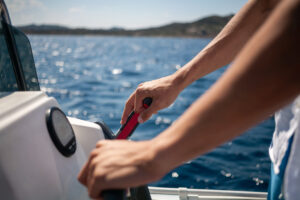Are permanent yacht jobs always better than temporary ones?

Whether you’re new to yachting or a seasoned crew member, choosing between the freedom of short-term contracts and the consistency of a permanent position is a difficulty many face. Both paths offer valuable experiences, but each comes with its own set of rewards and realities.
In this article, we take a closer look at the differences between temporary and permanent roles in the yachting industry.
From flexibility and lifestyle to progression and job security, we’ll explore how to find the right fit for your goals and how to build a sustainable, satisfying career on the water.

Temporary or freelance yacht roles can offer far more than just a stopgap between permanent jobs- they can open doors, build your network, and fast-track your experience in ways a long-term role might not.
Short-term positions often come with increased day rates or short-term contract premiums, making them financially attractive. But the benefits don’t stop there. Moving between different vessels gives you exposure to varied onboard cultures, leadership styles, and operating procedures. This is a fast and effective way to broaden your skillset and prove your adaptability.
For many crew, freelance or seasonal work also offers greater control over their schedule, allowing for better work-life balance; something that can be harder to achieve with the demanding schedule of a full-time role.
From the employer’s perspective, temporary placements are often used as a way to test compatibility before committing to a permanent hire. It’s not uncommon for temporary roles to evolve into long-term positions once trust and fit are established.
So, even if your end goal is stability, we don’t necessarily recommend overlooking short-term opportunities. They could be an ideal way to continue growing while staying flexible.
While short-term contracts can offer variety and flexibility, many yachts place high value on consistency, loyalty, and long-term crew retention. With recruitment being both time-consuming and costly, longevity on a CV is often seen as a strong indicator of reliability and professionalism.
Permanent positions also provide a solid platform for career development. Staying with one program allows you to take on more responsibility, build stronger working relationships, and develop an in-depth understanding of the yacht’s operations, preferences, and guest expectations.
In many cases, long-term crew are rewarded with greater investment from the vessel – whether that’s support for advanced training or internal progression opportunities. It’s a chance to grow not just in your role, but within a team that values and supports your development.
For those seeking career stability and long-term advancement, a permanent contract can offer the structure and support to thrive onboard.

While temporary contracts offer the freedom and flexibility many yacht professionals enjoy, they can come with trade-offs. Moving frequently between vessels means adapting to new teams, systems, and expectations, often with little time to settle in. It can also make it harder to form long-term relationships or feel truly part of a crew.
But a permanent role is not always the ideal alternative? Not necessarily.
While long-term contracts bring stability, they can sometimes limit your exposure to new challenges, vessels, or opportunities. For some crew, staying too long in one role can risk stagnation or delay wider career progression.
At YCRT, we understand that the most successful yachting careers are rarely built on just one type of contract. Instead, it’s about finding a rhythm that works for you – combining adaptability with long-term vision. Whether you’re rotating through freelance gigs or seeking your next permanent placement, striking the right balance between flexibility and longevity is key to a rewarding journey at sea.
There’s no simple answer when it comes to finding the perfect balance – it depends on your goals and lifestyle.
At YCRT, we encourage crew to explore both temporary and permanent roles with purpose whilst being mindful that your priorities may evolve over time.
Having a recruiter who truly understands your career aspirations can make all the difference. If you’re ready to find a role that fits, you can find all our latest roles at yachtcrew.uk/jobs.